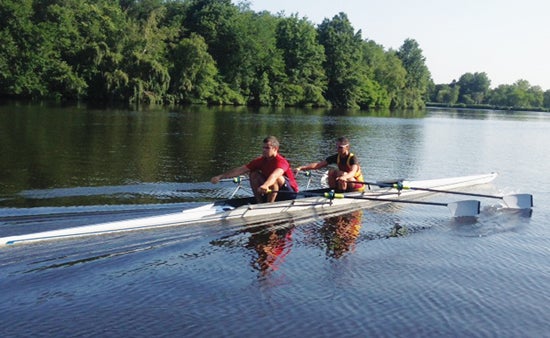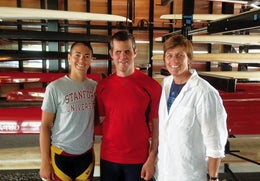ParaRowing Goes to World Championship

Rhode Island rowing head coach Shelagh Donohoe—who won a silver medal with the United States coxless fours boat at the 1992 Barcelona Olympics—was back with U.S. Rowing this summer, this time volunteering as the coach of the U.S. ParaRowing LTA (legs, trunk, arm) mixed double boat. She worked with the team of Andrew Johnson and Stephanie Cox, coaching the duo to a seventh-place finish at the World Championship in Amsterdam in August.
For Donohoe, who is entering her eighth season as Rhode Island’s head coach, working with the mixed double team presented challenges that differ from coaching the Rams. Johnson is blind, while Cox has multiple sclerosis. Two years ago, an MS-related episode left the right side of her body paralyzed. She has worked to regain 30 percent mobility in her right leg and 85 percent mobility of her right hand.

In July, Johnson and Cox won the U.S. Adaptive Trials finals, qualifying them for the World Championship in Amsterdam, being held Aug. 24 through Aug. 28. Johnson, who already knew Donohoe, asked her to work with them. Johnson and Cox worked out twice a day in Boston; Donohoe drove to Boston four times a week to join them.
“Once we were on the water, the practices were structured very similar to what I do with our women here,” Donohoe said. “The biggest difference is getting on the water, because that part takes much longer.”
Donohoe would talk Johnson—a six-time member of the U.S. ParaRowing Team—through the steps to get him from the boathouse to the water. Like any rower, he carries his own boat to the dock, but there were obstacles, twists and turns that he needed assistance with.
“In working with Andrew, I found that I was learning to communicate on a much higher level, which is giving me a different perspective in my coaching,” Donohoe said. “I couldn’t give him visual targets, and you start to realize how often we rely on those visual targets in rowing.”
While Johnson’s movements on land are deliberate and slowly paced, it’s a different story on the water.
“Once he is in the boat, it’s like he is free,” Donohoe said. “It’s pretty amazing, because he really does take off once he gets to the water.”
For Cox, the biggest concern is fatigue caused by MS. Only in her second year of rowing, Cox played lacrosse and rugby in college before joining the United States Air Force. It was while serving her country that she was diagnosed.
“Stephanie does not have a lot of feeling on the side of her body, but we work on everything as best as she can,” Donohoe said. “Heat can really affect MS, and she needs extra time to recover. Health is a factor with her workouts, so as a coach, my challenge was figuring out when to push her and when to pull back.”
Rhode Island company Resolute Racing, which has a relationship with Donohoe and the Rams, worked with the U.S. Adaptive Rowing Team on boat designs with special seats for the Para teams.
“This is a great experience that I am very proud to be a part of,” Donohoe said. “Working with Andrew and Stephanie made me a better coach, which is going to benefit the Rhode Island program. It’s really exciting to coach at the highest level and be back involved with U.S. Rowing.”
 Home
Home Browse
Browse Close
Close Events
Events Maps
Maps Email
Email Brightspace
Brightspace eCampus
eCampus


